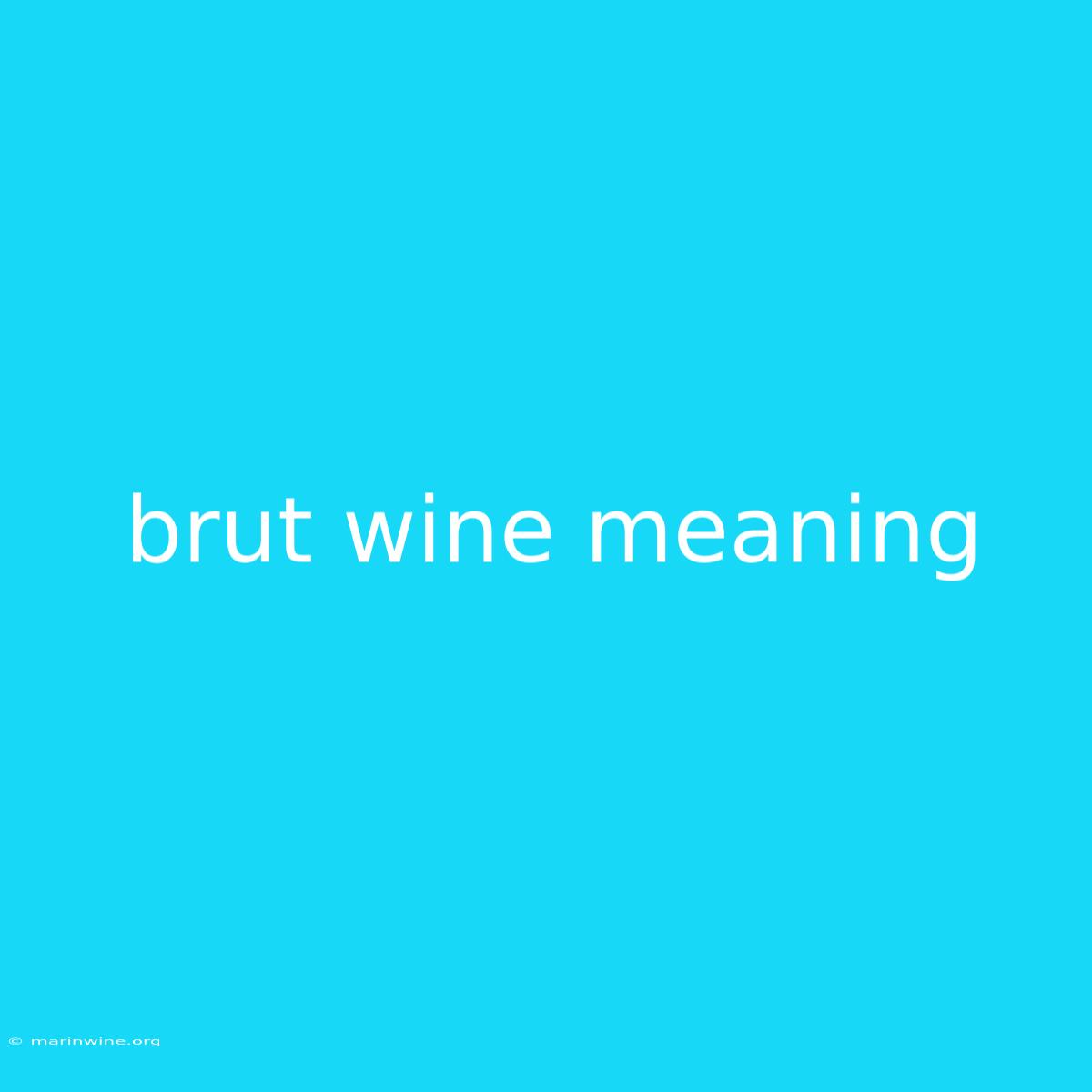Unveiling the Secrets of Brut Wine: A Comprehensive Guide
Editor's Note: This article delves into the fascinating world of Brut wine, uncovering its meaning and significance in the wine industry.
Why Brut Wine Matters
Understanding the term "Brut" is crucial for anyone navigating the world of sparkling wines, particularly Champagne. This article will explore the meaning of "Brut" in relation to sweetness levels, production methods, and its overall impact on the tasting experience. We'll uncover the nuances of this popular style, exploring its characteristics and helping you choose the perfect Brut wine for your palate. We'll also cover key aspects of Brut production, common misconceptions, and explore the relationship between Brut and other sparkling wine styles.
Key Takeaways of Brut Wine
| Feature | Description |
|---|---|
| Sweetness | Very dry, minimal residual sugar |
| Taste Profile | Crisp, clean, often with notes of citrus, green apple, or mineral |
| Food Pairing | Highly versatile, pairs well with shellfish, salads, appetizers, and cheeses |
| Production | Typically made using the méthode champenoise or similar traditional methods |
| Popularity | One of the most popular styles of sparkling wine worldwide |
Brut Wine: A Deep Dive
Introduction
Brut wine, often associated with Champagne, designates a specific level of sweetness in sparkling wine. Its defining characteristic is its dryness, a result of minimal residual sugar left after fermentation. This dryness contributes significantly to its crispness and refreshing quality.
Key Aspects of Brut Wine
- Low Residual Sugar: This is the defining characteristic. The lower the residual sugar, the drier the wine.
- Production Methods: Brut wines are typically produced using the méthode champenoise, a traditional method involving secondary fermentation in the bottle.
- Tasting Notes: Expect bright acidity, crispness, and flavors ranging from citrus to green apple, often with subtle mineral notes.
- Versatility: Brut's dryness makes it incredibly versatile for food pairing.
The Relationship Between Dosage and Brut Wine
Introduction
Dosage refers to the amount of sugar added to the wine after the second fermentation. This addition significantly impacts the final sweetness level. A crucial understanding of dosage is key to understanding Brut wine.
Facets of Dosage in Brut Production
- Role: Dosage determines the final sweetness level of the sparkling wine.
- Examples: Brut wines have a dosage of less than 12 grams of sugar per liter.
- Risks: Excessive dosage can mask the wine's delicate flavors and aromas.
- Mitigation: Careful control of dosage is essential for achieving the desired dryness and balance.
- Impacts: The lower the dosage, the drier and crisper the wine.
Summary
The relationship between dosage and Brut is paramount. The low dosage defines the dryness and crispness that makes Brut so appealing.
Brut Wine vs. Other Sparkling Wine Styles
Introduction
Brut wine differs from other sparkling wine styles based on its sweetness level. Understanding this difference enhances the ability to choose the right wine for different occasions and preferences.
Further Analysis
Brut wines are drier than other styles like Demi-Sec (medium-sweet) or Doux (sweet). This dryness influences the overall taste profile and food pairings. Consider comparing Brut to other styles to fully appreciate its unique attributes.
Closing
The key distinction lies in the sugar content. Knowing these differences will help you make informed choices and enhance your appreciation for sparkling wines.
Information Table: Brut Wine Characteristics Across Regions
| Region | Typical Tasting Notes | Average Dosage (g/L) | Food Pairing Suggestions |
|---|---|---|---|
| Champagne, FR | Citrus, green apple, brioche | <12 | Oysters, shellfish, salads, fine cheeses |
| Cava, ES | Apple, pear, citrus | <15 | Tapas, paella, cured meats |
| Prosecco, IT | Floral, pear, honeydew | <15 | Aperitifs, light pasta dishes, fruit desserts |
| Crémant, FR | Varies by region, often fruity and refreshing | <12 | Varies depending on the specific Crémant |
FAQ
Introduction
This section addresses common questions about Brut wine to enhance understanding.
Questions
- Q: What is the difference between Brut and Extra Brut? A: Extra Brut has an even lower sugar content than Brut.
- Q: Is Brut wine always Champagne? A: No, Brut is a style, while Champagne is a specific region.
- Q: How long can Brut wine be stored? A: Properly stored, quality Brut can age for several years.
- Q: What are some good food pairings for Brut? A: Shellfish, salads, appetizers, and many cheeses.
- Q: What makes Brut wine so popular? A: Its versatility, dryness, and refreshing character.
- Q: How is Brut wine made? A: Usually through the méthode champenoise, involving secondary fermentation in the bottle.
Summary
The FAQs clarify common misconceptions and provide a comprehensive overview of Brut wine.
Tips for Enjoying Brut Wine
Introduction
This section offers tips for enhancing your enjoyment of Brut wine.
Tips
- Serve Chilled: Brut should be served well-chilled, ideally around 45-50°F (7-10°C).
- Use the Right Glass: A flute or a coupe enhances the aroma and presentation.
- Pay Attention to the Bubbles: Observe the persistence and finesse of the bubbles.
- Savor the Aromas: Take time to appreciate the subtle aromas before tasting.
- Pair with Complementary Foods: Explore different food pairings to discover your preferences.
- Store Properly: Keep Brut wine cool and dark to preserve its quality.
Summary
These tips will elevate your experience with Brut wine and unlock its full potential.
Summary of Brut Wine
This article explored the meaning of Brut wine, emphasizing its dryness, production methods, and versatility. Understanding the nuances of Brut allows for a more informed and enjoyable experience.
Closing Message (Pesan Penutup)
The world of sparkling wine is vast, but understanding the significance of "Brut" provides a solid foundation for exploring its diverse offerings. Cheers to discovering your next favorite Brut!

